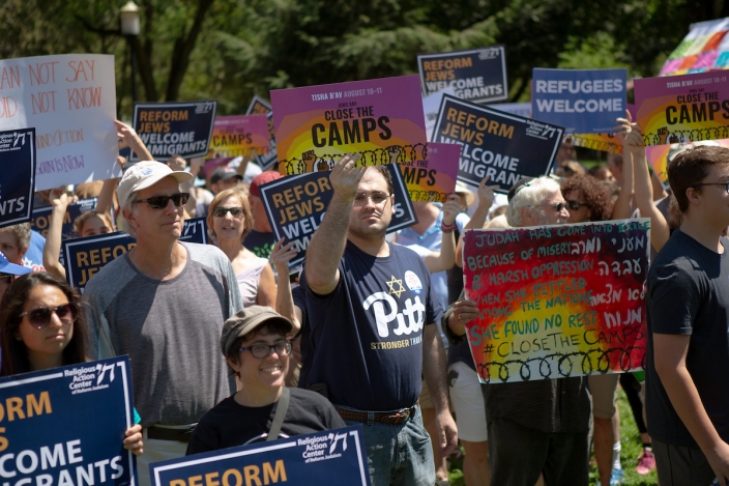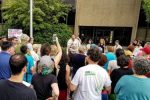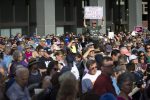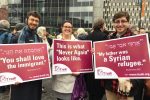In the middle of last Sunday’s “Tisha B’Av Lament for the Torment of Migrants and Refugees,” the crowd of several hundred people was asked to face the John F. Kennedy Federal Building in downtown Boston, which houses U.S. Citizenship and Immigration Services. “Separations happen on the border, in poultry factories and in courthouses in Boston,” said Rabbi Michael Rothbaum, one of the leaders of the vigil.
Rothbaum charged the crowd with remembering the immigrants in their lives. “If you were taught by an immigrant, related to an immigrant or if your child care, elder care or landscaping is done by an immigrant, if you love an immigrant, I want you to see this building and share your feelings now,” he said. Individuals in the crowd called out responses that included, “Never again,” “Shame on you,” “Wake up,” “Mercy,” “Close the concentration camps” and “We are all one.”
The Tisha B’Av gathering in Boston was one of several vigils and actions that took place across the country in cities that included New York, Chicago and San Diego. The protests and vigils were organized by a coalition of progressive Jewish organizations that included T’ruah: The Rabbinic Call for Human Rights, National Council of Jewish Women, Bend the Arc, Religious Action Center of Reform Judaism, Torah Trumps Hate and J Street. Rabbi Salem Pearce, T’ruah’s director of organizing, told JewishBoston the Tisha B’Av vigils were also planned for “surprising places like Des Moines and Salt Lake City. These gatherings are a wonderful demonstration of many Jewish social justice organizations coming together to mobilize a huge swath of the Jewish community. This is how much the issue has united the Jewish community.”
Tisha B’Av, a day of mourning, commemorates the destructions of the First and Second Temples in ancient Jerusalem on the same date more than a millennium apart. The day is traditionally a time to fast and reflect in general on the tragedies that have happened to the Jewish people. Rabbi David Jaffe of Sharon, one of the organizers of the Boston Tisha B’Av gathering, said at the vigil, “As a people once vulnerable, we have a duty to help.” Rabbi Toba Spitzer of West Newton said: “Today is a day of grief, a day to hear testimony. We sit with the pain at this moment in our country. Today we stand as witnesses in the Jewish community.”
The hour-long service in Boston included the chanting of the first and fifth chapters of the Book of Lamentations, the text that is traditionally read on Tisha B’Av. In between those text readings three testimonies of children detained at the border were read aloud. One testimony from “M” read: “I am 12 years old. I am currently detained here at the Clint CBP station with my 8-year-old sister and 4-year-old sister. The three of us crossed the border by land with our grandmother. My grandmother tried to show the officers a paper signed by my parents saying that my grandmother had been entrusted to take care of us. The officers rejected the paperwork, saying that it had to be signed by a judge. Then the officers took my dear grandmother away. We have not seen her since that moment. My sisters are still upset because they love her so much and want to be with her. … Everyone is hungry [here] because there is not sufficient food. The water here is horrible. It tastes like chlorine. Our parents live in Massachusetts. Every night my sisters keep asking me, ‘When will our mommy come get us?’ I don’t know what to tell them. There is one very young girl in my room, only 6 years old, who doesn’t know where she is from or where she is supposed to go. I don’t know what will happen to her. She said she was with her father but they had been separated.”
Pearce asserted that the immigration crisis is a quintessential Jewish issue. She noted that for the past couple of years, T’ruah has been working on a project called Mikdash: The Jewish Sanctuary Movement to guide synagogues and temples to become places of sanctuary. “Mikdash” is the Hebrew word for “sanctuary,” and the ancient temples were called Beit HaMikdash—house of sanctuary. “In our vocabulary, sanctuary spaces mean a lot of different things,” Pearce said. “It can mean immigrants staying in a physical building. It can also mean a variety of activities that are in solidarity with immigration, such as accompanying undocumented immigrants to deportation events.”
A stanza of a prose poem by rabbi and poet Mónica Gomery that T’ruah commissioned for the Tisha B’Av gatherings declares:
“God of transformation, God of t’shuvah: May this call of the shofar be a bridge between Olam Hazeh [the world we live in] and Olam Haba [the world to come]. May this call reaffirm for us that just as we can be transformed in the season of turning, our world too can be transformed. God of transformation, God of t’shuvah: May this call blast into our consciousness the possibility of redemption, of an end to the dehumanizing and targeting of immigrants, of a world in which all people find sanctuary, safety, and home.”
As Pearce observed, “Tisha B’Av is a time to mourn catastrophes that the Jewish people have faced, and there is a catastrophe happening right now.”






